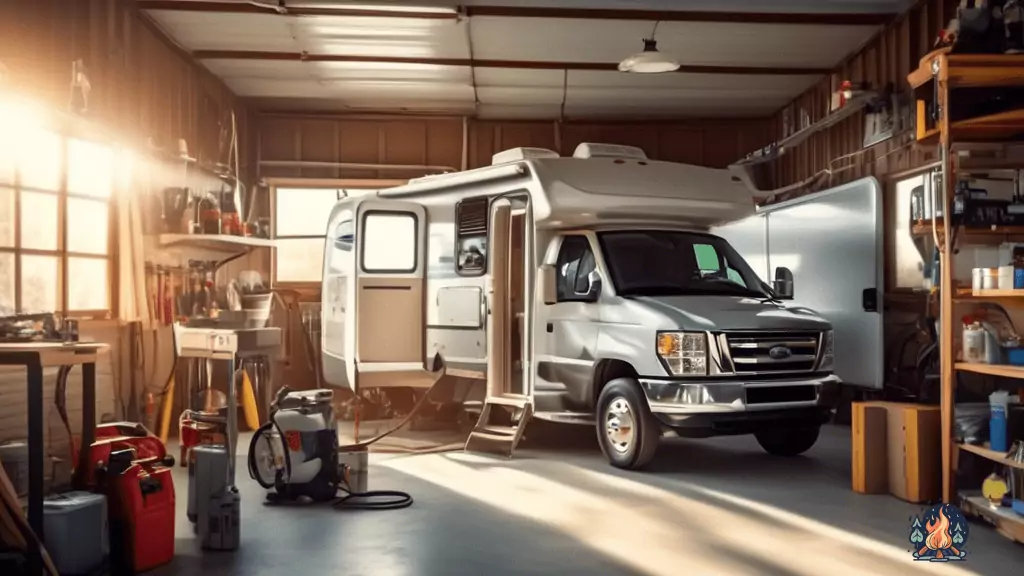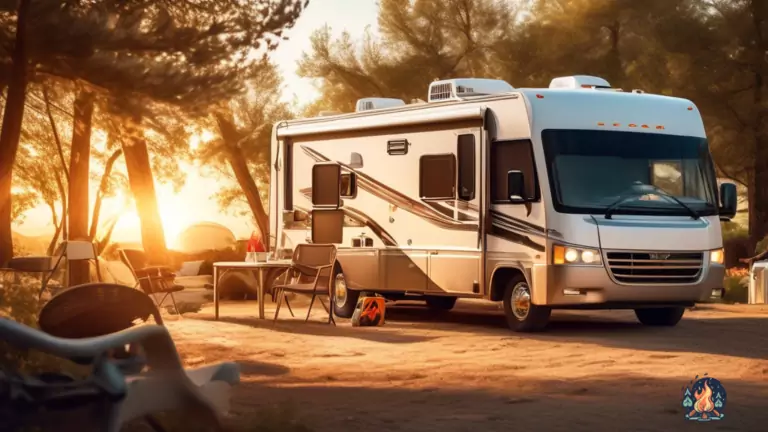Tips For Proper RV Battery Maintenance For Beginners
by Kevin Fairbanks • Updated: January 21, 2024
Learn the expert tips for maintaining your RV battery and keep it running smoothly! Don’t miss out on these essential maintenance tips for beginners. Click now to ensure your RV battery lasts longer!

Are you a beginner in the world of RVing and feeling a little overwhelmed by all the technical aspects? Don’t worry, we’ve got your back!
In this article, we’re going to share some valuable tips on how to properly maintain your RV battery. Whether you’ve just bought your first RV or you’re a seasoned camper looking for some refreshers, these tips will help you keep your battery in tip-top shape and avoid any unexpected power outages during your adventures.
Now, we know what you’re thinking – battery maintenance sounds about as exciting as watching paint dry. But fear not! We promise to keep things light-hearted and engaging. After all, who said learning about batteries couldn’t be fun?
So, grab a cup of coffee, put on your favorite camping hat, and get ready to dive into the world of RV battery maintenance. Trust us, by the end of this article, you’ll be a battery maintenance pro, and you might even crack a smile or two along the way!
Key Takeaways
- Avoid deep discharges of the RV battery
- Be mindful of temperature extremes and protect the battery from extreme heat or cold
- Regularly check and maintain the battery’s water levels, if applicable
- Implement proper charging and storage practices to extend the lifespan of the RV battery
Understanding the Basics of RV Batteries
Now that you’ve got your RV parked and ready to go, let’s dive into the basics of RV batteries and how to properly maintain them.
Ah, the magical power boxes of your beloved RV! These little powerhouses are responsible for keeping your refrigerator running, your lights shining, and your gadgets charged. It’s like having a tiny superhero in your vehicle! But just like any superhero, they need some TLC to keep them in tip-top shape.
First things first, let’s talk about the different types of RV batteries. You’ve got the lead-acid batteries, which are like the reliable old grandpas of the battery world. They’re affordable, durable, and have been around for ages.
Then there are the fancy lithium-ion batteries, which are like the cool, hip cousins that everyone wants to hang out with. They’re lightweight, have a longer lifespan, and can hold a charge for a longer period of time. Whichever type of battery you have, they all need some love and attention.
Now, you might be wondering, "How do I take care of these power-packed beasts?" Well, my friend, it’s all about keeping them charged and clean. Just like you need your morning coffee to function properly, your RV batteries need a good charge to do their job.
Make sure to keep them charged at all times, especially during those long periods of storage. And don’t forget to check the water levels in your lead-acid batteries regularly. Just like you, they need hydration too!
So, remember, my fellow RV adventurer, understanding the basics of RV batteries is crucial for a smooth and enjoyable journey. Take good care of them, keep them charged, and they’ll be your reliable sidekick throughout your travels. And hey, if all else fails, just give them a little pep talk. Who knows, maybe they’ll start singing "Eye of the Tiger" and give you that extra boost of power you need!
Choosing the Right Battery for Your RV
When you’re selecting the ideal battery for your RV, it’s crucial to consider the fact that approximately 80% of RV owners opt for deep cycle batteries due to their ability to provide sustained power for longer periods of time.
Now, I know what you’re thinking, "What’s a deep cycle battery? Is it like a marathon runner battery?" Well, my friend, you’re not too far off. Deep cycle batteries are like the marathon runners of the battery world. They are designed to deliver a steady, consistent flow of power over an extended time, just like those runners who never seem to run out of energy during a race.
So, whether you’re planning a short weekend getaway or a long cross-country trip, having a deep cycle battery in your RV will ensure that you have the power you need to keep your fridge running, your lights on, and your devices charged, without leaving you stranded in the middle of nowhere.
Now, let’s talk about the different types of deep cycle batteries you can choose from. We’ve got the flooded lead-acid batteries, the sealed lead-acid batteries, and the lithium-ion batteries. It’s like a battery buffet, and you get to be the ultimate battery connoisseur.
The flooded lead-acid batteries are the traditional choice, and they require regular maintenance to keep them in tip-top shape. Think of them as the high-maintenance divas of the battery world.
On the other hand, sealed lead-acid batteries are like the laid-back beach bums. They are maintenance-free and provide a reliable source of power, but they may not have the same longevity as the flooded lead-acid batteries.
And then we have the lithium-ion batteries, the rockstars of the battery universe. They are lightweight, have a longer lifespan, and can provide more power in a smaller package.
So, depending on your RV adventures and your battery preferences, choose the battery that suits your needs and get ready to power up your RV in style!
Proper Charging and Discharging Techniques
To ensure your RV battery lasts as long as possible, make sure you know the best ways to charge and discharge it. Proper charging and discharging techniques can significantly extend the lifespan of your battery and save you from unexpected breakdowns in the middle of nowhere. So, let’s dive into the electrifying world of RV battery management!
When it comes to charging your RV battery, there are a few key points to keep in mind. First, always use a charger specifically designed for deep-cycle batteries. This will ensure that the charging process is optimized for your battery’s needs. Additionally, avoid overcharging your battery as it can lead to permanent damage. To prevent this, consider using a smart charger that automatically adjusts the charging voltage based on the battery’s condition. Finally, don’t forget to disconnect any devices or appliances that might drain power from the battery while it’s charging. This will help maximize the charging efficiency and minimize any unnecessary energy loss.
On the other hand, discharging your RV battery is also an art that requires some finesse. It’s generally recommended to avoid fully discharging your battery, as it can shorten its overall lifespan. Instead, aim to keep the battery level above 50% whenever possible. To monitor the battery level, consider investing in a battery monitor or using a multimeter to regularly check the voltage. Additionally, avoid leaving your battery in a discharged state for extended periods of time, as it can lead to sulfation – a condition where sulfate crystals build up on the battery plates and reduce its capacity. Lastly, don’t forget to turn off any power-hungry devices when you’re not using them. This will help conserve battery power and give you more time to enjoy the open road.
To summarize all the charging and discharging techniques in a fun and engaging way, here’s a handy table that you can refer to:
| Charging Techniques | Discharging Techniques |
|---|---|
| Use a deep-cycle battery charger | Avoid fully discharging the battery |
| Consider a smart charger for optimal charging | Keep the battery level above 50% whenever possible |
| Disconnect appliances while charging | Avoid leaving the battery in a discharged state for long periods |
| Don’t overcharge the battery | Turn off power-hungry devices when not in use |
Remember, mastering the art of charging and discharging your RV battery is an essential skill for any RV enthusiast. So, charge like a pro and discharge with caution, and you’ll be well on your way to a long-lasting battery and many more adventures on the road!
Regular Inspection and Maintenance
Make sure you regularly inspect and maintain your RV battery to ensure its optimal performance. After all, you wouldn’t want your battery to go on strike just when you’re in the middle of nowhere, would you?
Here are a couple of things you should keep in mind:
- Visual Inspection: Take a good look at your battery every now and then. Check for any signs of damage, like cracks or leaks. If you see any, it’s time to call in the battery doctor. Oh, and don’t forget to make sure the connections are tight and corrosion-free. Nobody likes a loose connection, especially your battery.
- Keep it Clean: Your RV battery may not have the same standards as your mother-in-law, but it still appreciates a good cleaning. Wipe off any dirt or grime that may have accumulated on the battery surface. And while you’re at it, give those terminals a good scrub too. A clean battery is a happy battery, or so they say.
- Charge it Right: Just like your phone needs a good charge to survive the day, so does your RV battery. Don’t let it go completely dead, unless you want it to join the afterlife prematurely. On the other hand, don’t overcharge it either. Your battery isn’t a balloon, and it definitely doesn’t want to burst. So, find that sweet spot and keep your battery juiced up just right.
- Get a Battery Tender: No, we’re not talking about the latest fashion accessory. A battery tender is a nifty little device that keeps your battery happy and healthy. It provides a slow and steady charge to your battery, so it doesn’t get all stressed out. Think of it as a spa day for your battery, but without the cucumber slices.
So, there you have it. A few simple steps to keep your RV battery in tip-top shape. Remember, a well-maintained battery is a happy battery, and a happy battery is a reliable companion on your RV adventures. Now go forth, my friend, and give that battery the love and attention it deserves. Happy RVing!
Extending the Lifespan of Your RV Battery
Extending the lifespan of your RV battery is crucial for maximizing its performance and longevity. After all, you don’t want your battery to kick the bucket in the middle of nowhere, leaving you stranded and in need of a jumpstart.
So, here are a few tips to help you keep your RV battery going strong.
First and foremost, avoid deep discharges whenever possible. Your battery doesn’t appreciate being completely drained, just like you don’t appreciate being woken up at 3 am by a rooster. So, try to keep an eye on your battery’s charge level and recharge it before it reaches a critically low point. It’s like giving your battery a little energy boost to keep it going.
Secondly, be mindful of temperature extremes. Your RV battery is like a delicate flower, and extreme hot or cold temperatures can wreak havoc on its performance. So, try to keep your battery in a Goldilocks zone of temperature, where it’s not too hot, not too cold, but just right. It’s like finding the perfect temperature for your morning coffee, except this time it’s for your battery’s well-being.
By taking these steps, you can ensure that your RV battery stays in tip-top shape and keeps powering your adventures for years to come.
Frequently Asked Questions
Can I use a regular car battery in my RV?
Of course you can use a regular car battery in your RV! It’ll be a great opportunity to test your survival skills when your battery dies in the middle of nowhere. Good luck!
How often should I check the water levels in my RV battery?
You should check the water levels in your RV battery at least once a month. But don’t worry, it’s not as exciting as checking your social media feed. Just grab a flashlight and a glass of water, and you’ll be good to go!
Is it safe to leave my RV battery connected to a charger for an extended period of time?
It’s generally safe to leave your RV battery connected to a charger for an extended period, but don’t turn it into a permanent relationship! Give your battery some space too, so it doesn’t feel smothered.
Can I use a solar panel to charge my RV battery?
Sure! Did you know that using a solar panel to charge your RV battery is not only eco-friendly, but also cost-effective? It’s a win-win situation for your wallet and the planet! So go ahead and harness that sunshine power!
What should I do if my RV battery is not holding a charge?
If your RV battery isn’t holding a charge, don’t panic! First, check for loose connections and make sure it’s properly connected. If that doesn’t work, it might be time to call in the battery doctor.

Hi, I’m Kevin, a lifelong camping enthusiast and the voice behind Campfire Discoveries. From tent to RV to cabin camping, I’ve explored it all. Join me as we share stories and tips around the campfire, deepening our connection with the great outdoors.
Keep Reading
-
Essential Tips For RV Electrical System Maintenance
Keep your RV running smoothly with these essential tips for electrical system maintenance. Click now to unlock the secrets and keep your home on wheels powered up!
-
Spacious Camping: Tents With Multiple Rooms
Upgrade your camping game with spacious tents featuring multiple rooms. Sleep soundly, stay organized, and make the most of your outdoor adventure. Click here to find your perfect tent with multiple rooms!
-
Discover The Desert: RV Camping In Breathtaking Landscapes
Experience the thrill of RV camping in breathtaking desert landscapes. Discover hidden gems and immerse yourself in nature’s beauty. Click here to embark on an unforgettable adventure now!



